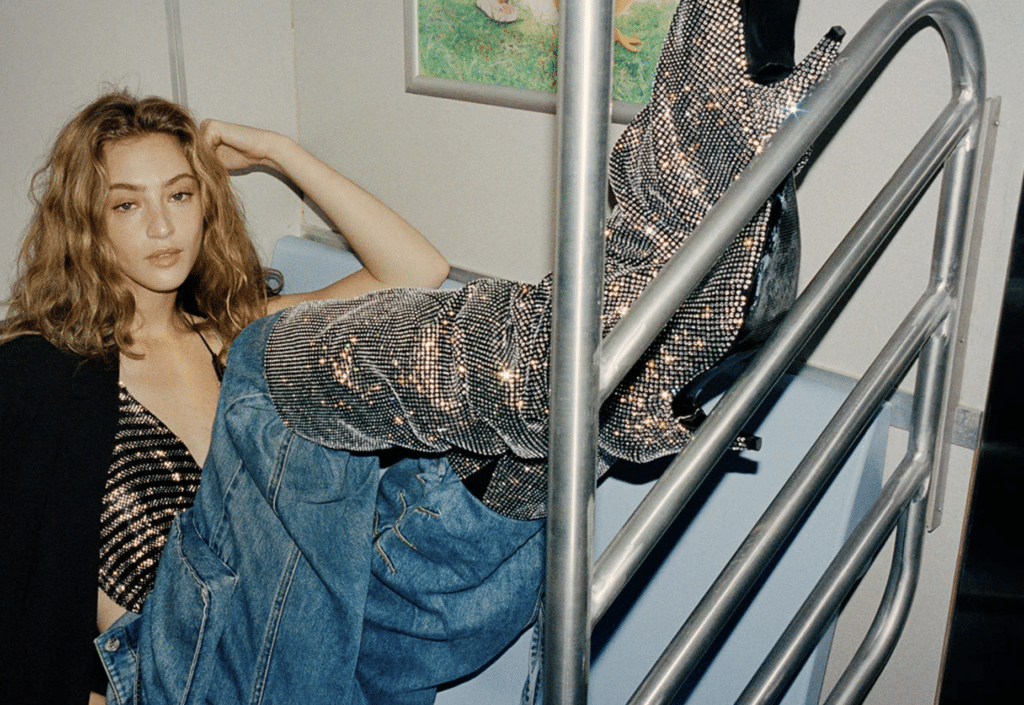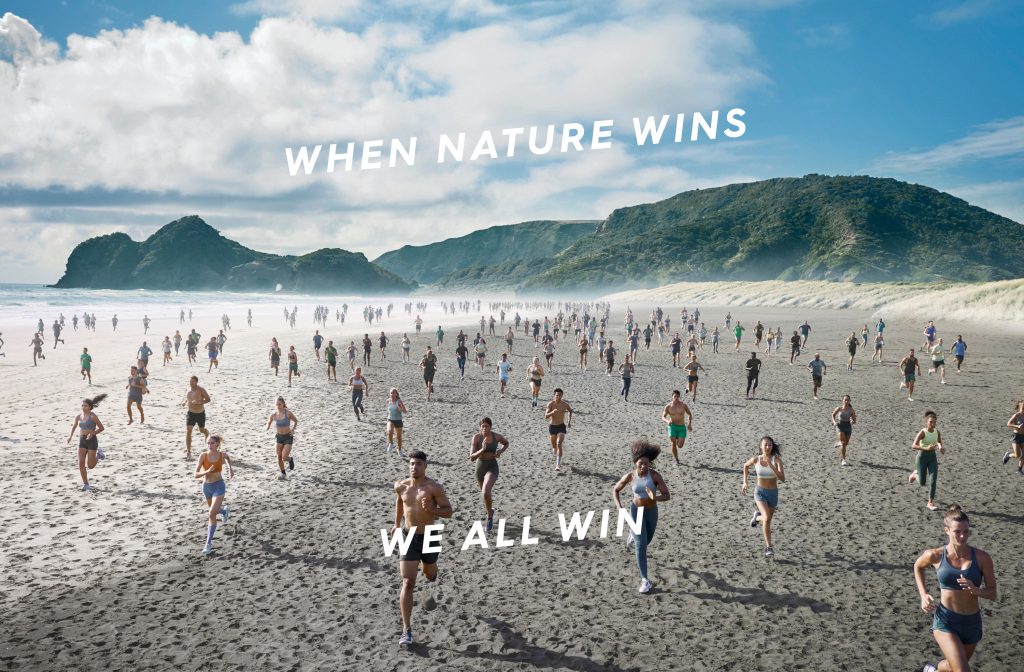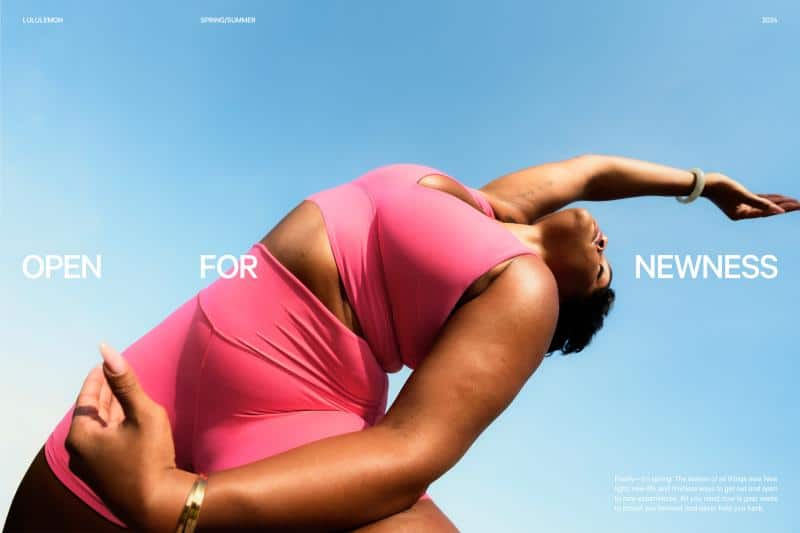“To be honest with you, I haven’t had a lot of lawsuits,” Steve Madden told Fashionista back in 2014. “It’s surprising if you think about it, [given] the amount of business that I’ve done.” The amount of business his eponymous footwear brand does is sizable; as of last year, the Nasdaq-traded, New York-headquartered brand generated $2 billion in revenue (down from $2.1 billion in 2022 but up from $1.7 billion in 2019), selling hundreds – if not thousands – of styles of shoes at any given time through its retail and wholesale businesses.
Relatively speaking, the brand may not be sued as frequently as you might expect of a billion dollar-plus brand in the business of fast fashion, but that does not mean that Steve Madden has not been entangled in its fair share of infringement-centric legal matters. As the New York Times wrote back in 2013, Mr. Madden [is] dogged by a reputation as a copycat,” pointing to lawsuits initiated by Alexander McQueen and Balenciaga around that time.
Since then, a growing number of additional legal squabbles have come up. Here is a brief timeline of them, all of which have settled out of court ahead of trial, and a number of which have actually been initiated by Madden’s legal team, mostly in response to cease-and-desist letters that the brand has received …
Aug. 2023 – AirWair and Dr. Martens v. Steve Madden
AirWair International Ltd., which owns the trade dress for Dr. Martens footwear, filed suit against Steve Madden, alleging that it was manufacturing and selling footwear that was confusingly similar to Dr. Martens footwear. Specifically, AirWair argued that Steve Madden was selling shoes that made use of the elements of Dr. Martens’ famed boot, which consists of but is “not limited to the combination of the following features: (1) yellow welt stitching; (2) a grooved sole edge; (3) an angled heel; (4) a two-tone sole edge; (5) the DMS sole pattern; (6) the “DMS” side view cleat pattern; and (7) a yellow and black heel loop.”
The alleged infringement by Madden comes after the parties entered into a settlement and release agreement back in 2018 in order to settle an earlier suit that AirWair lodged against Madden. “Despite being on notice of AirWair’s rights, Steve Madden continues to launch, sell, and offer for sale new footwear styles that infringe upon, counterfeit, and/or dilute AirWair’s rights,” the company claimed.
Jul. 2024 – Steve Madden v. Ganni A/S
In a lawsuit initiated by Steve Madden, the footwear company alleged in a complaint that it filed with the U.S. District Court for the Southern District of New York in July 2024 that despite lacking rights in its $425 Buckle Ballerina flats and Two-Strap sandals, Ganni has been “harassing and threatening” it on the basis of its sale of allegedly infringing footwear of its own. In particular, Madden claimed that Ganni has sought to block its sale of its $99 GRAYA and SANDRIA styles by way of “a rapid series of cease-and-desist letters.” And not only targeting Steve Madden, the footwear company claims that Ganni is “attempting to strong-arm Steve Madden [wholesale] customers,” such as Dillard’s and Nordstrom, “to destroy rightful Steve Madden designs and harm [its] relationships with its customers.”
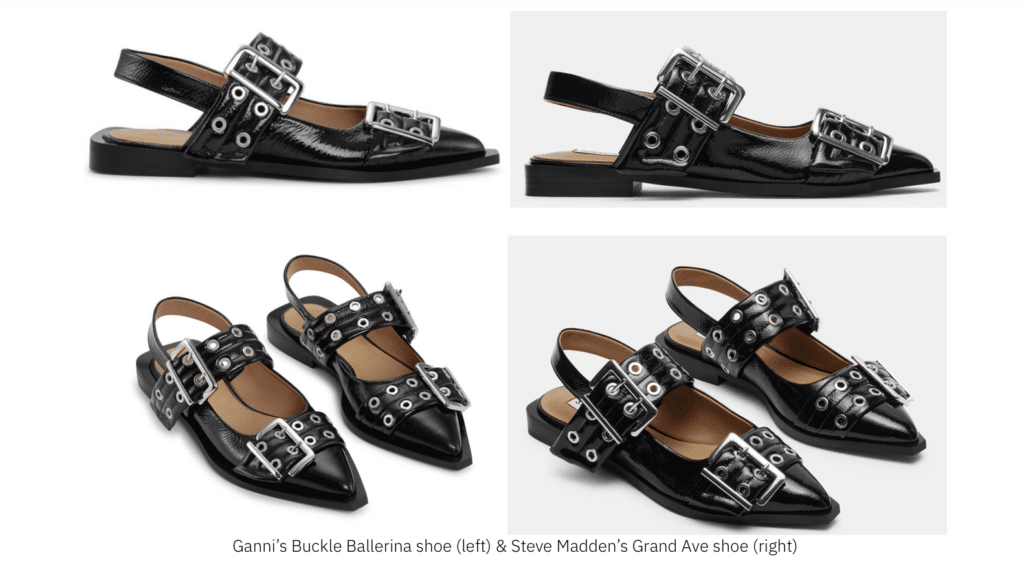
Ganni has since walked back on its IP-centric threats, admitting in a motion to dismiss and covenant not to sue in November that it “does not own or control any U.S. registered copyrights, trademarks, or trade dress in the relevant designs, nor does it own a patent covering the design,” thereby, doing away with the need for a court to issue a declaration saying so.
Jun. 2023 – Skechers v. Steve Madden
Skechers U.S.A., Inc. filed suit against Steve Madden in June 2023 “to address Madden’s abuse of Skechers’ legally protected and federally registered and unregistered trademarks.” Despite Steve Madden’s “awareness of Skechers’ well-known marks,” Skechers alleged that Madden was using a following confusingly similar mark on its “Kennie” sneaker. Skechers argued that the logo used by Madden on the allegedly infringing sneaker is “substantially similar to Skechers’ ‘S’ marks, as it is essentially a stylized ‘S’ of similar (if not nearly identical) proportions and thicknesses to multiple logos used by Skechers that has been rotated slightly counterclockwise and placed in the same location where Skechers typically places its marks.”
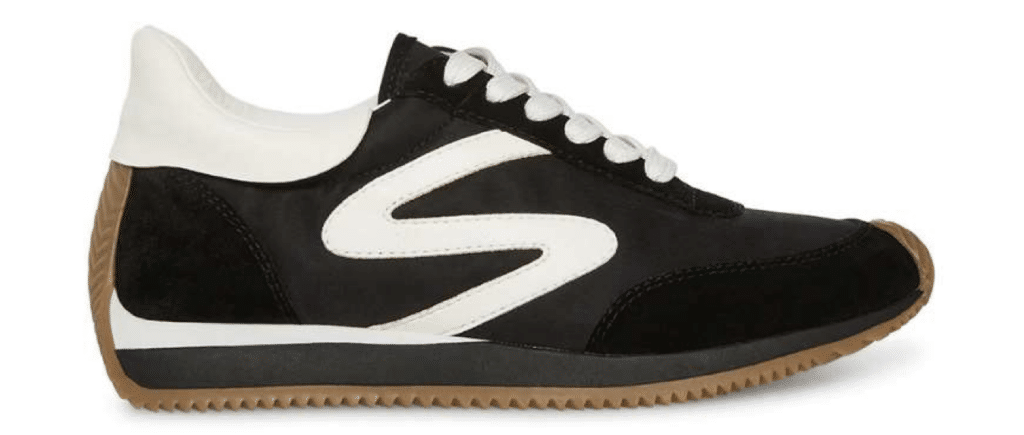
Moreover, Skechers maintained that Madden was “using this logo on similar products marketed to the same consumers in the same channels, making it highly likely that consumers will be confused as to whether Skechers is responsible for, distributes, has authorized or licensed, or is otherwise involved with the shoes that Madden is selling.”
Sept. 2021 – Atkins v. Steve Madden Ltd.
On September 14, 2021, Nicolas Atkins and Benjamin Solomon filed suit against Steve Madden Ltd. (“defendant”), asserting claims for copyright infringement, false designation of origin, and unfair competition. In a complaint that largely mirrors the one waged against Madden by Josue Pacheco, Atkins and Solomon argued that Madden misappropriated their New York-based mural for an advertising campaign that was “seen by many customers worldwide” and “shared across a network of . . . social media channels.”
Sept. 2021 – Josue Pacheco v. Steve Madden
Street artist Josue Pacheco a/k/a Werds filed a copyright infringement lawsuit against Steve Madden, alleging that “in or about 2016, [he] painted an outdoor mural,” which Steve Madden “inexplicably featured … in a marketing campaign without [Pacheco’s] knowledge or consent.” Specifically, he argued that the Steve Madden campaign “included still images of the mural and was posted widely across Steve Madden’s social media, including on its YouTube channel, and Facebook and Twitter accounts.” In furtherance of his infringement claim, Pacheco asserted that “Madden’s exploitation of the mural is particularly damaging because [he] has carefully avoided any association with corporate culture or mass- market consumerism.”
May 2020 – Converse v. Steve Madden
Steve Madden “sells sneakers, but instead of innovating its own designs, it often copies others,” Converse asserts in complaint that it lodged against its fellow footwear-maker. The Nike-owned brand, which filed suit against Steve Madden in a federal court in Boston in May 2020, claims that Madden is on the hook for infringing two design patents that cover ornamental elements of its statement-making Run Star Hike platform sneaker.
The case comes after Steve Madden began offering up its “Madden Girl Winnona Flatform High-Top sneaker” in March 2020, just over a year after Converse began selling its patent-protected Run Star Hike. Counsel for Converse swiftly sent a cease-and-desist letter to Madden, informing the brand of its rights in the protected elements of the sneaker and “demanding that Steve Madden immediately stop infringing,” only to have the brand allegedly fail to respond and continue to offer up the “infringing” sneaker.
Apr. 2020 – Deckers Outdoor Corp. v. Steve Madden
UGG’s parent company Deckers Outdoor Corp. sued Steve Madden for trade dress infringement, unfair competition, and design patent infringement in connection with the latter’s manufacture and sale of a fluffy, slingback slipper, that Deckers claims looks a bit too much like one that its UGG brand has sold – and heavily promoted – in recent years.
In its complaint, California-based Deckers asserted that “competitor” Steve Madden has actively sold a lookalike pair of “Fuzz” slippers “in an effort to exploit Deckers’ goodwill and the reputation of [UGG’s Fluff Yeah shoe],” and that such “bad faith and unlawful acts have misled and confused consumers, and were intended to cause confusion or to cause mistake, or to deceive as to the affiliation, connection, or association of the [allegedly infringing footwear] with Deckers, and the origin, sponsorship, or approval of the product by Deckers,” with such elements of confusion and mistake being central to a claim of trademark – or here, trade dress – infringement.
Aug. 2019 – Steve Madden v. Rothy’s
Steve Madden filed suit against Rothy’s after receiving a cease and desist letter from the brand in connection with lookalike footwear that it was offering for sale. According to the complaint that it filed in a Delaware federal court in August 2019, Steve Madden claimed that in early August, legal counsel for Rothy’s sent it a cease-and-desist letter, threatening legal action over Madden’s alleged “acts of patent infringement, federal trade dress infringement, dilution and misappropriation,” just as Rothy’s has done to “multiple other companies” in the past.
In that case, Madden asked the U.S. District Court for the District of Delaware to clear up any uncertainty and declare that it is not infringing Rothy’s rights by way of its Rosy Flat, which Rothy’s calls “a slavish copy” of its “The Point” ballet flat, and asserts that “an ordinary observer would be deceived into believing that [Madden’s Rosy flats] are the same as Rothy’s The Point design.”
Rothy’s has lodged handful of claims of its own in response to Madden’s lawsuit in an effort to “stop yet another instance in Madden’s pattern of slavishly infringing intellectual property rights of its competitors.”
Jan. 2019 – Lucky Horse Press v. Steve Madden
In a complaint lodged in a New York federal court in early 2019, Lucky Horse alleges that Steve Madden is on the hook for copyright infringement for selling a backpack featuring its design “in or around 2017.” On March 29, 2018, soon after discovering the infringement, Lucky Horse says that it sent Steve Madden a cease-and-desist letter, “notifying the company of the infringement and requesting basic sales data … in furtherance of an amicable resolution.” But such an amicable out-of-court settlement was not in the cards, and Lucky Horse Press filed suit against Madden for copyright infringement.
Dec. 2018 – Alice + Olivia v. Steve Madden
Alice + Olivia hauled Betsey Johnson and Steve Madden into court for using its founder and creative director’s face to sell a line of handbags. Despite alerting the two fashion companies of their infringing activities, New York-based Alice + Olivia claimed in the copyright, trademark, and trade dress infringement, trademark dilution, and unfair competition lawsuit that Betsey Johnson and Steve Madden were “unfairly, unlawfully, and intentionally [seeking] to copy, co-opt, and exploit a design” depicting founder Stacey Bendet’s face, and would not stop.
Aug. 2018 – Steve Madden v. YSL
In something of a role reversal, Steve Madden called foul on Yves Saint Laurent, alleging in a lawsuit that YSL had threatened to sue in connection with its patent and trade dress-protected Tribute shoe, a move that Madden called “a bad faith attempt to stifle legitimate competition in the footwear industry.” As a result, Madden filed suit, asking a New York federal court to declare that it was not infringing YSL’s high heeled Tribute shoe and to establish that YSL lacks rights in the design of its Tribute flat sandal.
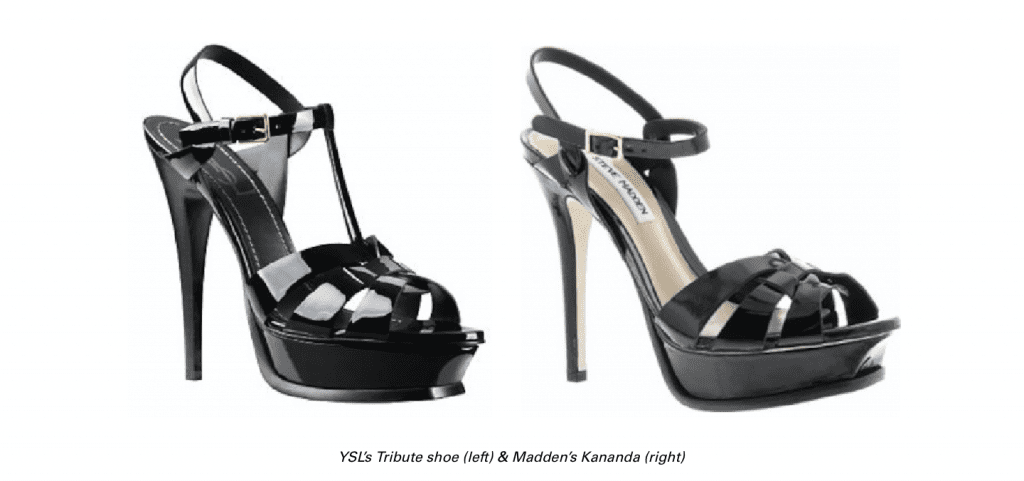
Mar. 2018 – Steve Madden v. Cult Gaia
In response to threats of litigation, Steve Madden filed suit against Cult Gaia, taking issue with Cult Gaia owner Jasmin Larian’s alleged rights in its famed bamboo clutch. To be exact, Madden took issue with Cult Gaia’s rights in its famed bamboo clutch, and claimed that instead of actually creating an original bag, the Cult Gaia Ark bag “slavishly copies the traditional Japanese bamboo picnic bag design.”
In its formal response, Jasmin Larian, LLC alleged that the New York-based accessories giant’s lawsuit was little more than the act of “a big corporation that’s looking to cash in on [Cult Gaia’s] hard-earned rights and dupe consumers into believing the knock-off bags are genuine,” and in reality, Madden was running afoul of the law and should be forced to pay over $15 million in damages as a result.
The parties settled their respective claims and the case was dismissed in July 2019.
Dec. 2017 – Allbirds v. Steve Madden
San Francisco-based startup Allbirds filed suit in federal court in San Francisco, accusing Madden of allegedly copying its wool trainer, and giving rise to its claim of trade dress infringement. Madden subsequently counterclaimed that Allbird’s asserted trade dress “is generic, lacks secondary meaning, and is merely ornamental” and “consists exclusively of functional elements.” Madden’s defense relies on Allbird’s own statements that its design is simplistic as well as third-party use of similar designs.
Jun. 2017 – Valentino v. Steve Madden
Valentino filed a copyright infringement suit against Madden in the U.S. District Court for the Northern Division of Georgia, a federal court in Atlanta, alleging that the notorious copycat accessories brand has replicated one of its most sought-after bags, as well as one of its $800+ bag straps. According to its suit, in 2015, Valentino created “a two-dimensional design that it applied to a handbag,” as well as its Camubutterfly Strap Design – both of which enjoy federal copyright protection in the U.S. According to Valentino’s complaint, Steve Madden took to manufacturing and selling “substantially and strikingly similar” bags and bag straps of its own.
The Italian brand claimed that it “did not authorize Steve Madden to copy or make derivative works of the Double Purse Design or the Camubutterfly Strap Design,” and “in doing so, Steve Madden has violated Valentino’s exclusive rights.”
Mar. 2017 – AirWair and Dr. Martens v. Steve Madden
Steve Madden was slapped with a trade dress infringement lawsuit from AirWair International, a subsidiary of Dr. Martens footwear for “knowingly and intentionally” copying one its best selling shoe designs. According to United Kingdom-based Dr. Marten’s complaint, which was filed in the U.S. District court in the Northern District of California, Steve Madden was producing footwear that is “substantially identical” to the well-known Dr. Marten’s 1460 Boot.
Dr. Martens – which describes itself not only as “widely recognized and extremely popular” but also as a brand that has “achieved recognition as ranking among the world’s greatest and most recognizable brands” – alleged that Steve Madden is making very specific and blatant use of its 1460 Boot trade dress. The supposedly infringing footwear “unlawfully copies and uses the Dr. Martens trade dress and distinctive features of Dr. Martens footwear, including the two tone grooved sole edge, DMS undersold, and heel loop.”
Jun. 2016 – Aquazzura v. Steve Madden
After filing suit against Ivanka Trump and Marc Fisher in June 2016, Florence-based footwear brand Aquazzura filed suit against Steve Madden for copying a number of its most popular footwear designs. According to Aquazzura’s complaint, which was filed in the Southern District of New York, notorious copycat Steve Madden replicated at least four of its best-selling styles and was “intentionally targeting and seeking to sell the Infringing Shoes to [Aquazzura’s] customers and potential customers who are familiar with the well-known trade dress of Aquazzura’s shoes.”
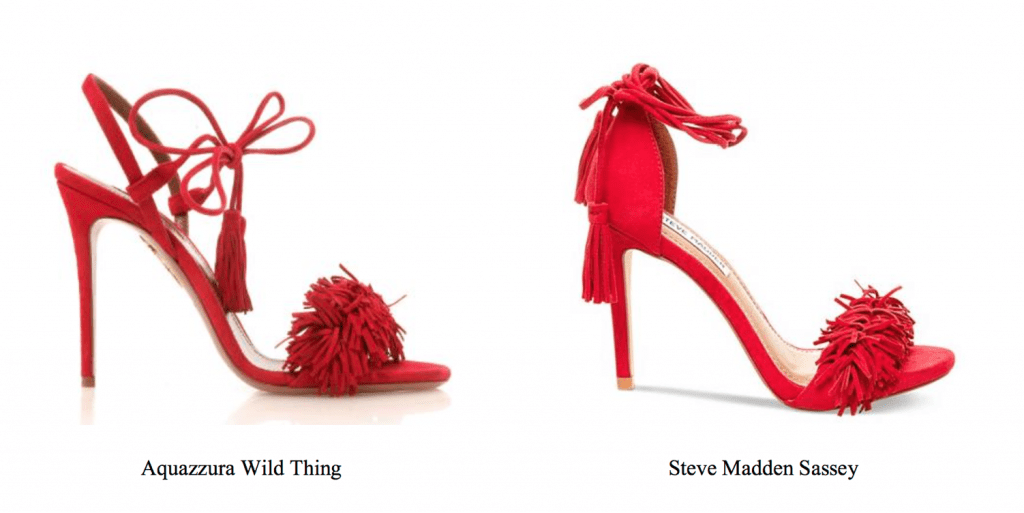
Oct. 2015 – Stella McCartney v. Steve Madden
Stella McCartney sued copycat footwear and accessories brand Steve Madden for copying. The item at issue: her best-selling Falabella bag. According to McCartney’s complaint, which was filed in the Southern District of New York court, Madden had been “importing and selling a tote bag, that, although virtually identical in appearance to [McCartney’s] design, is a poorly-made copy.” McCartney went on to assert that Madden “has on more than one occasion been involved in selling shoes that are alleged to copy the trade dress of well-known fashion designers,” and asserted that “the risk that consumers will be misled [as to the source of Madden’s copy] was heightened since McCartney is well-known for working with others on collaborations to market garments incorporating key design features associated with [her brand].”
Jul. 2015 – Skechers v. Steve Madden
Skechers USA Inc. filed suit against notorious copycat Steve Madden Ltd., alleging that its rival infringed seven of its design patents. In its lawsuit, which was filed in the United States District Court for the Central District of California, Skechers took issue with the woven elastic upper and molded rubber bottom of Madden’s alleged copy, which is too close for comfort to its patent protected SKECHERS GO WALK footwear.
May 2014 – Balenciaga v. Steve Madden
Balenciaga slapped Steve Madden with a trademark lawsuit … again. Paris-based design house filed suit against Steve Madden Ltd in the Southern District of New York, alleging that the footwear brand infringed the trade dress that extends to its celebrated Motorcycle bag. The design house, which is owned by luxury conglomerate, Kering, claimed that Steve Madden is manufacturing and marketing a cheaper version of its Motorcycle bag, which was specifically designed confuse consumers.
Jun. 2011 – Jeffrey Campbell v. Steve Madden
On the heels of filing suit against Forever 21, Jeffrey Campbell accused Steve Madden of design patent and trade dress infringement and unfair competition lawsuit in connection with its pattern of allegedly copying Jeffrey Campbell’s hot-selling “Lita” shoe design. Campbell claimed that Steve Madden’s $169.95 Carnby-L shoe design “is believed to be a copy or knockoff of Jeffry Campbell’s Lita Shoe design.”
Dec. 2009 – Balenciaga v. Steve Madden
In December 2009, Balenciaga filed suit against Steve Madden alleging copyright infringement, unfair competition, and trademark infringement (among other claims) in connection with its lookalike versions of the “Lego” shoes that Balenciaga had showed as part of its Fall/Winter 2007 collection. The parties settled the suit nearly two years later, with Madden paying Balenciaga an “undisclosed amount,” with its eponymous founder saying, “[Balenciaga] did a multicolored shoe and we did it. It was stupid.”
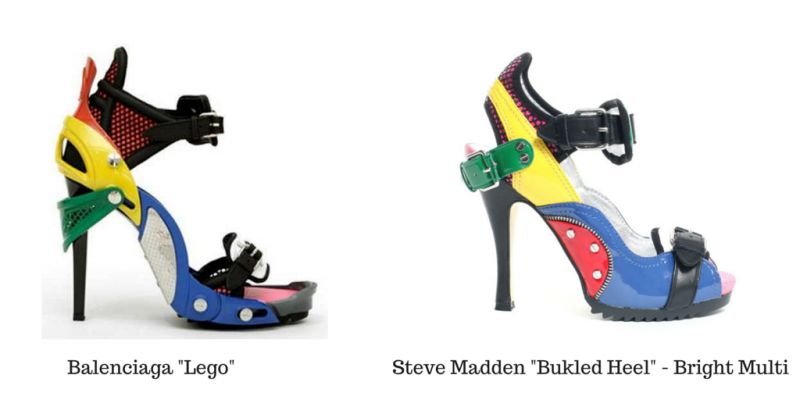
Oct. 2009 – Alexander McQueen v. Steve Madden
Alexander McQueen – via its intellectual property holding company, AUTUMNPAPER LIMITED – filed a trade dress lawsuit against U.S. footwear giant Steve Madden, alleging that Madden’s Seryna bootie was a “studied imitation” of its Faithful bootie. The lawsuit, which was filed in the Southern District of New York, arose after McQueen’s lawyers sent Madden a cease and desist letter requesting that the company stop making and selling the shoe, and Madden refused to oblige. The two companies reportedly voluntarily settled the lawsuit out of court as early as June 2011, but the case was not officially dismissed by the presiding judge until September 2011.
Jan. 2006 – Deckers v. Steve Madden
UGG’s parent company Deckers Outdoor Corporation filed a trademark and trade dress infringement suit against Steve Madden in the U.S. District Court in Los Angeles, alleging that Madden was making and selling copycat versions of UGG’s Rock Star and Uptown sheepskin boots. The Madden shoes, according to Deckers, included “reproductions of UGG’s registered Sun Design Logo and unique design elements on the uppers and soles of the boots.”
The parties settled the matter in April 2006, and according to a release from Deckers, Steve Madden, Ltd. “acknowledged infringement, agreed to pay a confidential amount in settlement, and agreed to an injunction prohibiting it from using the term “UGG” as a trademark or in referring to Steve Madden, Ltd. products, and from using Deckers’ registered Sun Logo trademark as part of the settlement. Madden must also “cease development, reproduction, manufacturing, advertising, promoting, selling, offering to sell, importing, or distributing any of the infringing products.”
Updated
November 21, 2024
This article was first published in May 2014 and has been routinely updated.







